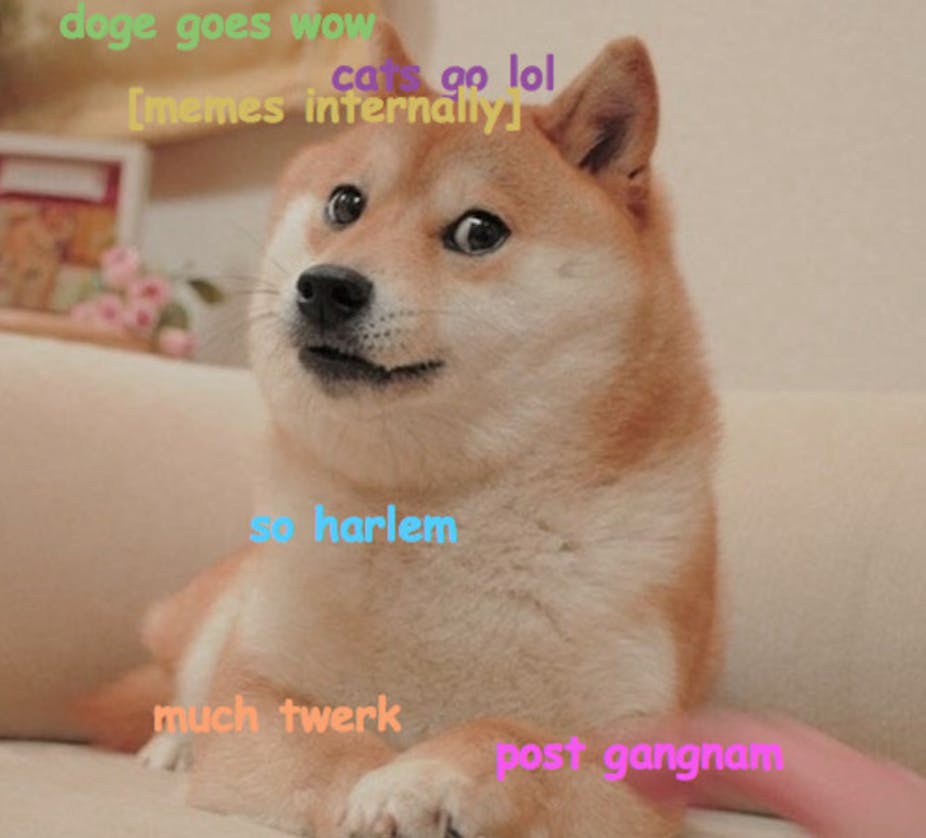In the world of internet memes, 2013 was without doubt the Year of the Doge. Participants on Twitter, Tumblr and reddit created and circulated their own narrations of this Shiba’s fragmented internal monologue, and adapted the aesthetic beyond its roots. Doge – a meme popular enough to ironically revive the much-maligned Comic Sans font – found its way to top meme lists produced by Know Your Meme, Wired, and TIME.

Joining the esoteric little Shiba were the performance memes twerking and The Harlem Shake, the smash viral sensation from Ylvis attempting to answer the age-old question, what does the fox say?, and the 4chan-born and Tumblr-bred practice of creative, bracketed subtitling.
But in 2013’s top pop internet trends, we see shades of established themes. Looking through Know Your Meme top lists from 2012, 2011, and 2010, there are clear connections that unite individual examples and genres. 2013 may have been the Year of the Doge, but it may not have been if 2008 wasn’t the year of the LOLCat.
LOLCats – early image macros that also intertwine cute animals and playful linguistic derivations – have been staple memes for half a decade now. Their precedent, as Annalee Newitz argues on i09, means a starting point for something related but distinct in Doge. The tie between Doge and LOLCats evidences how memes operate as what I’ve called a media lingua franca, a “common tongue” for participants to express and share based on balancing the fixed and the novel, the familiar and the foreign.
Kate Miltner, a research consultant at Microsoft Research New England, argued in her thesis that this shared aesthetic process facilitates social connections. Doge works broadly because it’s a novel take on established forms and recurring tropes in memes, one that spreads and shares well. Mostly accessible and intrinsically cuddly, Doge maps well onto the non sequitur visual humour in mediated cultural participation.
The common tongue evident in Doge is also evident in other images shared more esoterically. Even beyond LOLCats, animal innocence, non-standard English, and aesthetic simplicity are common marks of memetic humor. And this humour can take a dark turn too, as this 4chan-famous comic parody of Donald Duck called Dolan demonstrates:

In this comic, one of the more tame Dolan entries and an example of a meme that didn’t make a mainstream top list, Dolan applies the cuddly animal common tongue to darker ends.
Even the placement of the text in an archetypical Doge meme exists beyond Doge. This 4chan image, from one of many threads riffing on the life of medieval peasants, shares Doge’s nonstandard English, fragmented stream-of-consciousness, and text placement:

So from LOLCats to Dolan to medieval peasants, Doge shares his throne. He may be 2013’s top meme, but his aesthetics fit nicely in established internet artifacts.
The same goes for 2013’s top videos and the performative remixes they inspired. Yvlis’ The Fox, Baauer’s Harlem Shake, and Miley Cyrus’ Wrecking Ball were all ripe for circulation and transformation, because they shared themes common in video memes from years past, just like Psy’s Gangnam Style, Invisible Children’s Kony 2012, and Rebecca Black’s Friday.
Limor Shifman argues in her book Memes in Digital Culture that people spread and share content that’s simple, emotional and encourages participatory engagement. As with image memes, these common themes meant 2013’s top videos had much in common with those that came before.
Shifman argues 2012’s Gangnam Style spread because Psy was an unknown in the west (and therefore fit the YouTube affinity for sharing the work of ordinary people), because the song was simple and repetitious (encouraging both imitation and transformation), and because of its whimsical humour.
All three justifications can be applied to the Norwegian comedy duo Yvlis, and their unexpected hit about what a fox says. David Marchese, profiling the duo for SPIN, makes similar comparisons between the top novelty songs of 2012 and 2013. Yvlis view their 2013 fame with quizzical bemusement. Their success may be an anomaly, but the chord they struck is well-established.
However, decontextualising the “foreign” and appropriating the “novel” can mean homogenisation and hegemony. The lingua franca can assimilate at the cost of diverse voice, undermining one of participatory media’s greatest promises.
For this reason, The Harlem Shake is a conflicted entry in 2013’s top memes. Catherine Knight Steele, a PhD student at the University of Illinois, Chicago, argues its ubiquitous remixes worked to “further marginalise rather than liberate” its namesake predominantly-minority American community. Twerking is similarly charged. So was some of the racial stereotyping that emerged with Antoine Dodson’s 2010 Bed Intruder YouTube hit. In these cases, the common tongue denigrated minorities.
From Doge to the Fox, 2013 saw internet memes further entrenched in popular conversation. The lessons from this crop of memorable artefacts, though, is the themes persisting year after year, even as LOLCats fade and Gangnam goes.

